words of emotions
找寻文字的浪漫句子英文
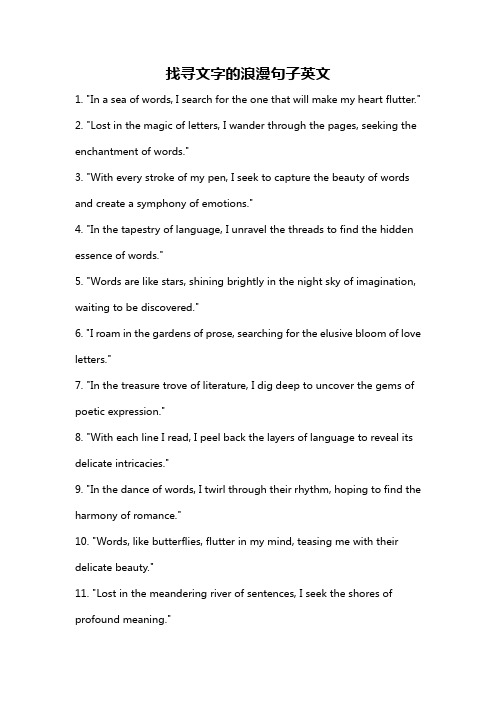
找寻文字的浪漫句子英文1. "In a sea of words, I search for the one that will make my heart flutter."2. "Lost in the magic of letters, I wander through the pages, seeking the enchantment of words."3. "With every stroke of my pen, I seek to capture the beauty of words and create a symphony of emotions."4. "In the tapestry of language, I unravel the threads to find the hidden essence of words."5. "Words are like stars, shining brightly in the night sky of imagination, waiting to be discovered."6. "I roam in the gardens of prose, searching for the elusive bloom of love letters."7. "In the treasure trove of literature, I dig deep to uncover the gems of poetic expression."8. "With each line I read, I peel back the layers of language to reveal its delicate intricacies."9. "In the dance of words, I twirl through their rhythm, hoping to find the harmony of romance."10. "Words, like butterflies, flutter in my mind, teasing me with their delicate beauty."11. "Lost in the meandering river of sentences, I seek the shores of profound meaning."12. "On the canvas of language, I paint vivid pictures with words, capturing the essence of romance."13. "With every word I write, I chase the elusive dream of weaving a tapestry of passion."14. "Searching the text, I savor the utterances of love that leave an indelible mark on my soul."15. "In the realm of fiction, I journey through worlds, in pursuit of words that make my heart soar."16. "In the symphony of poetry, I seek the melody that resonates with the depths of my being."17. "Words, like whispers, fill the air, as I navigate the labyrinth of literature in pursuit of romance."18. "Deep within the pages of novels, I find solace in the embrace of words that speak to my heart."19. "In the library of my mind, I rearrange shelves of phrases, searching for the perfect combination of words."20. "With my fingers gliding over the keys, I seek the ecstasy of expressing my innermost desires through words."21. "Between the lines, I discover the flicker of passion, hidden in the depths of prose."22. "In the enchanted forest of literature, I venture forth in search of words that paint a portrait of love."23. "Within the ink that stains the parchment, I find the whispers of longing and desire."24. "In the silence between paragraphs, I hear the symphony of emotions that words convey."25. "Through the haze of sentences, I embrace the intoxicating scent of romantic expression."26. "With each word I uncover, I unravel the mystery of emotions encapsulated in black and white."。
高中英语 Unit 21《Body Language》说课稿 新人教版必修1
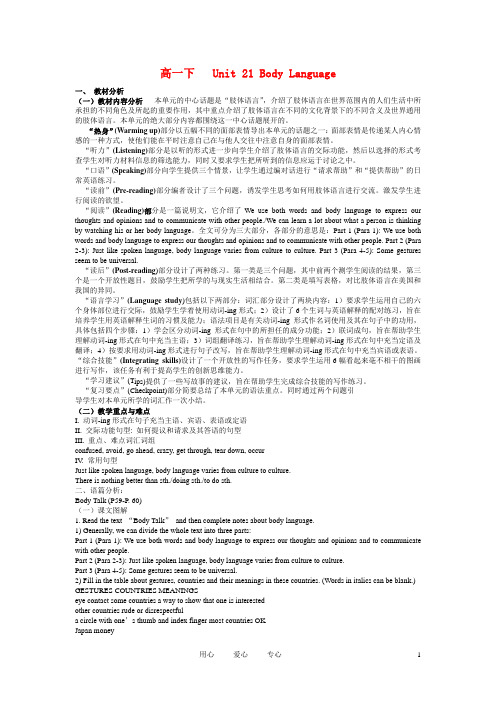
高一下 Unit 21 Body Language一、教材分析(一)教材内容分析本单元的中心话题是“肢体语言”,介绍了肢体语言在世界范围内的人们生活中所承担的不同角色及所起的重要作用,其中重点介绍了肢体语言在不同的文化背景下的不同含义及世界通用的肢体语言。
本单元的绝大部分内容都围绕这一中心话题展开的。
“热身”(Warming up)部分以五幅不同的面部表情导出本单元的话题之一:面部表情是传递某人内心情感的一种方式,使他们能在平时注意自己在与他人交往中注意自身的面部表情。
“听力”(Listening)部分是以听的形式进一步向学生介绍了肢体语言的交际功能,然后以选择的形式考查学生对听力材料信息的筛选能力,同时又要求学生把所听到的信息应运于讨论之中。
“口语”(Speaking)部分向学生提供三个情景,让学生通过编对话进行“请求帮助”和“提供帮助”的日常英语练习。
“读前”(Pre-reading)部分编者设计了三个问题,诱发学生思考如何用肢体语言进行交流。
激发学生进行阅读的欲望。
“阅读”(Reading)部分是一篇说明文,它介绍了We use both words and body language to express our thoughts and opinions and to communicate with other people./We can learn a lot about what a person is thinking by watching his or her body language。
全文可分为三大部分,各部分的意思是:Part 1 (Para 1): We use both words and body language to express our thoughts and opinions and to communicate with other people. Part 2 (Para 2-3): Just like spoken language, body language varies from culture to culture. Part 3 (Para 4-5): Some gestures seem to be universal.“读后”(Post-reading)部分设计了两种练习。
形容人的感受的英文单词
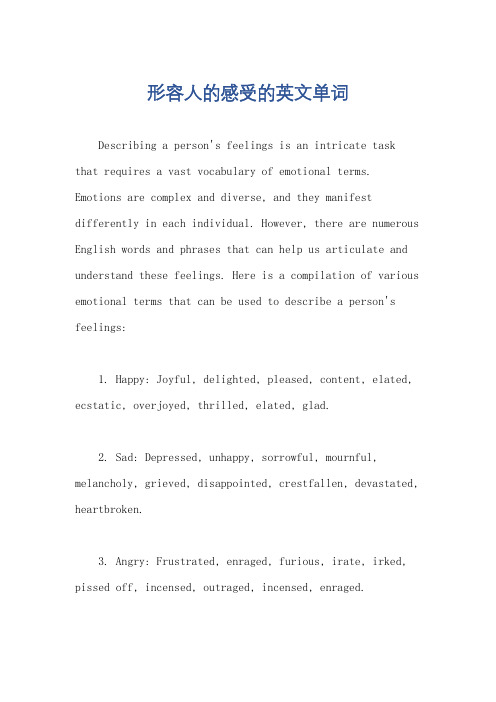
形容人的感受的英文单词Describing a person's feelings is an intricate taskthat requires a vast vocabulary of emotional terms. Emotions are complex and diverse, and they manifest differently in each individual. However, there are numerous English words and phrases that can help us articulate and understand these feelings. Here is a compilation of various emotional terms that can be used to describe a person's feelings:1. Happy: Joyful, delighted, pleased, content, elated, ecstatic, overjoyed, thrilled, elated, glad.2. Sad: Depressed, unhappy, sorrowful, mournful, melancholy, grieved, disappointed, crestfallen, devastated, heartbroken.3. Angry: Frustrated, enraged, furious, irate, irked, pissed off, incensed, outraged, incensed, enraged.4. Excited: Thrilled, eager, anticipatory, eager, enthusiastic, excited, stimulated, pumped, stimulated, jittery.5. Surprised: Astonished, amazed, shocked, startled, taken aback, surprised, astonished, dumbfounded, bewildered, perplexed.6. Anxious: Worried, tense, apprehensive, nervous, jittery, unsettled, agitated, fretful, anxious, on edge.7. Confused: Bewildered, perplexed, puzzled, confused, uncertain, doubtful, hesitant, indecisive, at a loss, at sea.8. Loved: Affectionate, fond, warm, tender, adoring, doting, attached, loving, affectionate, caring.9. Hateful: Resentful, bitter, envious, jealous, hateful, odious, loathsome, detestable, abhorrent, repugnant.10. Tired: Exhausted, weary, tired, fatigued, spent, jaded, knackered, rundown, beat, worn out.These are just a few examples of the vast array of words available to describe a person's feelings. However,it's important to note that feelings are subjective and individual, and not all people may experience or express them in the same way. Additionally, feelings can be complex and may involve multiple emotions at once.Moreover, feelings can be influenced by various factors such as culture, personal experiences, and social context. Therefore, when trying to understand or communicate someone's feelings, it's important to consider thesefactors and approach the situation with empathy and openness.Finally, it's worth mentioning that while words can help us articulate our feelings, they are often limited in expressing the full depth and complexity of emotional experiences. Sometimes, feelings may be best expressedthrough other means such as art, music, or simply sharing them with someone we trust.。
emotion情感英语

emotion情感英语Emotion plays a crucial role in language learning, especially in the context of English as a second language. Understanding and expressing emotions in English can enhance communication and build stronger interpersonal relationships. Here's a breakdown of how to approach the topic of emotion in English:1. Vocabulary: Start by learning the basic vocabulary related to emotions. This includes words like happy, sad, angry, excited, scared, and so on.2. Adjectives and Adverbs: Learn adjectives and adverbs that describe emotions to add depth to your language. For example, "ecstatic" for a high level of happiness, or "furious" for a strong sense of anger.3. Phrases and Expressions: Familiarize yourself with common phrases and expressions that convey emotions. For example,"I'm on cloud nine," to express extreme happiness, or "My heart sank," to convey disappointment.4. Body Language: Recognize that emotions are not only expressed through words but also through body language. Practice using facial expressions and gestures that are common in English-speaking cultures.5. Tone of Voice: The way you say something can convey emotion. Practice using different tones to express happiness,sadness, anger, etc.6. Idioms and Slang: Learn idiomatic expressions and slang related to emotions. For example, "to be blue" means to be sad, and "to blow a fuse" means to become very angry.7. Cultural Context: Understand that the expression of emotions can vary greatly between cultures. What is considered polite or appropriate in one culture may not be in another.8. Practice: Role-play different scenarios where you might need to express emotions, such as in a job interview, during a social gathering, or in a crisis.9. Listening Skills: Improve your listening skills to better understand the emotions conveyed by native speakers through their words, tone, and body language.10. Empathy: Develop empathy to better connect with others on an emotional level. This can lead to more meaningful and effective communication.11. Non-Verbal Communication: Learn to read and use non-verbal cues such as eye contact, facial expressions, and posture to convey and interpret emotions.12. Emotional Intelligence: Develop your emotional intelligence to manage your own emotions and respond appropriately to the emotions of others.By focusing on these areas, you can improve your ability to understand and express a wide range of emotions in English, which is essential for effective communication and social interaction.。
英文优美句子带翻译

英文优美句子带翻译As the saying goes, "A picture is worth a thousand words." Similarly, a beautiful sentence can convey a world of emotions and thoughts. The English language, with itsrich vocabulary and diverse grammar, offers endless possibilities for crafting elegant and meaningful sentences. In this document, we will explore a collection of beautiful English sentences along with their translations, in order to appreciate the beauty and power of language.1. "The sun loved the moon so much that he died every night to let her breathe." 太阳如此爱着月亮,以至于他每晚都会死去,只为让她呼吸。
2. "She was like the moon part of her was always hidden away." 她就像月亮一样,她的一部分总是隐藏着。
3. "In the end, we only regret the chances we didn't take." 最后,我们只会后悔没有抓住的机会。
4. "You were born with wings, why prefer to crawl through life?" 你生来就有翅膀,为什么选择在生活中匍匐前行?5. "The only way to do great work is to love what you do." 做出伟大的工作的唯一方法就是热爱自己的工作。
72个情绪词汇英语

72个情绪词汇英语Title: The Spectrum of Emotions in English: 72 Vocabulary Words That Capture the Essence of Feelings.Emotions are the vital lifeblood of human experience, shaping our interactions, decisions, and responses to the world. They are as diverse as they are complex, rangingfrom the subtle nuances of everyday life to the overwhelming intensity of profound moments. In English, we have a rich vocabulary to describe these emotions, allowing us to communicate our inner states with precision and clarity. Here are 72 vocabulary words that capture the essence of various emotions in English.1. Joy: The delighted, happy feeling that comes from achieving success, receiving good news, or spending timewith loved ones.2. Laughter: The sound and expression of joy, amusement, or mockery. It is a powerful social tool that bonds peopletogether.3. Delight: A strong pleasure or pleasure in something pleasant or agreeable.4. Pleasure: A state of happiness or enjoyment derived from something.5. Elation: A feeling of great happiness and satisfaction, often caused by success or good fortune.6. Ecstasy: A state of extreme happiness or rapture, often associated with sexual or spiritual union.7. Contentment: A state of satisfaction and happiness with one's life or circumstances.8. Serenity: A calm, peaceful, and undisturbed state of mind.9. Tranquility: A state of calmness and lack of disturbance, promoting peace and relaxation.10. Bliss: A state of extreme happiness and fulfillment, often associated with spiritual or religious experiences.11. Anger: A strong feeling of annoyance, displeasure,or hostility.12. Fury: Extreme anger or rage, often expressed violently.13. Irritation: A feeling of annoyance or impatience caused by something that annoys or disturbs.14. Annoyance: A feeling of displeasure or impatience caused by something irritating or troublesome.15. Disgust: A feeling of intense dislike or aversion towards something considered unclean, immoral, or repellent.16. Envy: A painful or resentful awareness of another's advantages, successes, or possessions.17. Jealousy: A feeling of intense rivalry or suspicion towards someone who is perceived as a threat to one's relationship or status.18. Frustration: A feeling of annoyance or impatience resulting from being unable to achieve something desired or expected.19. Sadness: A feeling of unhappy or unhappy, often caused by loss, disappointment, or failure.20. Sorrow: A feeling of deep and lasting sadness, often caused by a significant loss or tragedy.21. Depression: A state of profound sadness and loss of interest in activities that were once enjoyable.22. Melancholy: A feeling of deep and persistent sadness, often accompanied by a lack of energy and enthusiasm.23. Grief: The intense sorrow and pain felt after theloss of a loved one or something valuable.24. Bereavement: The state of being deprived of someone or something loved, often resulting in sadness and loneliness.25. Fear: A feeling of alarm or anxiety caused by the presence or imminence of danger.26. Terror: Extreme fear or panic, often caused by a perceived threat to one's safety or life.27. Anxiety: A feeling of unease, worry, or nervousness about future events or outcomes.28. Dread: A feeling of intense fear or dread, often associated with a looming threat or danger.29. Panic: A state of extreme fear and agitation, often leading to loss of control and rational thinking.30. Horror: A feeling of extreme fear and disgust,often caused by something gruesome or horrifying.31. Surprise: A feeling of astonishment or amazement caused by something unexpected or unusual.32. Astonishment: A feeling of great surprise and amazement, often accompanied by a lack of belief or disbelief.33. Amazement: A feeling of extreme surprise and wonder, often caused by something remarkable or extraordinary.34. Curiosity: A desire to learn or know something,often manifesting as a feeling of interest or wonder.35. Intrigue: A feeling of excitement and interest caused by something mysterious or captivating.36. Bewilderment: A feeling of confusion or puzzlement caused by something complex or difficult to understand.37. Shock: A strong feeling of surprise or dismaycaused by something unexpected or distressing.38. Dismay: A feeling of alarm or consternation caused by something unpleasant or unexpected.39. Embarrassment: A feeling of awkwardness or discomfort caused by being put in an awkward or embarrassing situation.40. Shame: A feeling of humiliation or disgrace caused by something done or said that is considered immoral or shameful.41. Guilt: A feeling of worry or unease caused by consciousness of having done something wrong, such as causing harm to another person.42. Remorse: A feeling of deep regret and sorrow for something done or said that is considered immoral or harmful.43. Penitence: A feeling of repentance and sorrow forpast sins or wrongs, often accompanied by a desire to make amends.44. Contrition: A feeling of deep regret and repentance, often expressed through confession and apology.45. Admiration: A feeling of respect and approval for someone or something considered excellent or worthy.46. Respect: A feeling of high regard and esteem for someone or something considered valuable or important.47. Awe: A feeling of reverence and wonder caused by something sublime or magnificent.48. Admiration: A feeling of approval and respect for someone or something considered excellent or admirable.49. Appreciation: A feeling of gratitude andrecognition for someone or something considered valuable or beneficial.50. Delight: A feeling of pleasure and satisfaction derived from something enjoyable or pleasing.51. Affection: A feeling of tender love and affection, often towards a family member or close friend.52. Gratitude: A feeling of thankfulness and appreciation for someone or something that has benefited or helped you.53. Love: A strong feeling of affection and attachment towards someone or something, often accompanied by a desire to be with or protect them.54. Affection: A feeling of tender love and affection, often towards a family member or close friend.55. Affectionateness: The tendency to show affection or kindness towards others.56. Devotion: A feeling of deep and sincere love and loyalty towards someone or something, often expressedthrough actions or worship.57. Tenderness: A feeling of gentleness and care towards someone or something, often manifesting as kindness or compassion.58. Romance: A feeling of love and passion towards someone, often expressed through courtship or romantic gestures.59. Intimacy: A close and personal relationship with someone, often involving sharing thoughts, feelings, and experiences.60. Compassion: A feeling of sympathy and empathy towards someone who is suffering or in need, often manifesting as a desire to help or alleviate their pain.61. Empathy: The ability to understand and share the feelings and experiences of others.62. Sympathy: A feeling of pity and sorrow for someonewho is suffering or in distress.63. Pity: A feeling of compassion and sorrow for someone who is weak,不幸的, or in need of help.64. Solitude: A state of being alone, often enjoyed for its peaceful and contemplative qualities.65. Loneliness: A feeling of sadness and isolation caused by being alone or separated from others.66. Boredom: A feeling of being uninterested or indifferent towards something or someone, often caused by lack of stimulation or variety.67. Ennui: A feeling of listlessness, dissatisfaction, and dissatisfaction with life, often caused by a lack of purpose or excitement.68. Apathy: A lack of interest or concern towards something or someone, often manifesting as indifference or detachment.69. Disinterest: A lack of interest or enthusiasm towards something, often caused by a belief that it is unimportant or uninteresting.70. Ambivalence: A feeling of mixed or conflicting emotions towards someone or something, often resulting in indecision or hesitation.71. Indifference: A lack of interest or concern towards someone or something, often manifesting as indifference or neglect.72. Apathy: A lack of feeling or emotion towards something or someone, often caused by a lack of interest or involvement.Emotions are the lifeblood of human experience, shaping our interactions, decisions, and responses to the world. The rich vocabulary of English allows us to describe and communicate these emotions with precision and clarity. These 72 vocabulary words capture the essence of variousemotions, from joy and anger to sadness and fear. They reflect the diverse and complex range of human emotions, allowing us to express our inner states with greater understanding and empathy.。
情绪中蕴含着情感英语
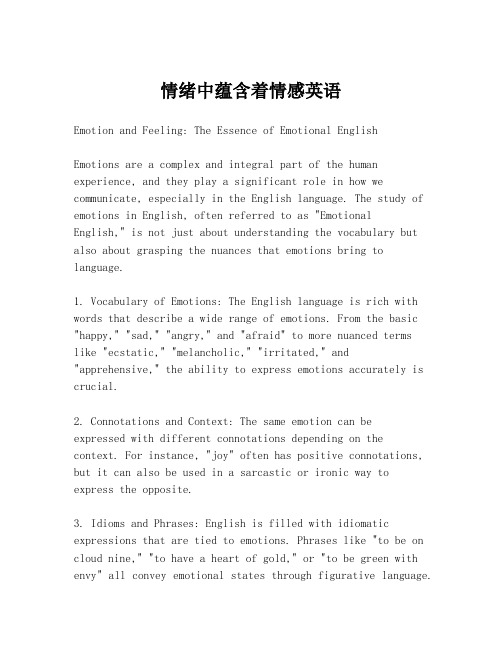
情绪中蕴含着情感英语Emotion and Feeling: The Essence of Emotional EnglishEmotions are a complex and integral part of the human experience, and they play a significant role in how we communicate, especially in the English language. The study of emotions in English, often referred to as "Emotional English," is not just about understanding the vocabulary but also about grasping the nuances that emotions bring to language.1. Vocabulary of Emotions: The English language is rich with words that describe a wide range of emotions. From the basic "happy," "sad," "angry," and "afraid" to more nuanced termslike "ecstatic," "melancholic," "irritated," and "apprehensive," the ability to express emotions accurately is crucial.2. Connotations and Context: The same emotion can beexpressed with different connotations depending on the context. For instance, "joy" often has positive connotations, but it can also be used in a sarcastic or ironic way to express the opposite.3. Idioms and Phrases: English is filled with idiomatic expressions that are tied to emotions. Phrases like "to be on cloud nine," "to have a heart of gold," or "to be green with envy" all convey emotional states through figurative language.4. Emotional Intelligence in Communication: Understanding and expressing emotions is a part of emotional intelligence. It's not just about knowing the words but also about perceiving the emotions of others and responding appropriately.5. Cultural Aspects: Emotions can be expressed differently across cultures. What is considered a polite expression of gratitude in one culture might be seen as overly emotional in another. Learning about these cultural nuances is part of mastering Emotional English.6. Non-Verbal Cues: Often, emotions are conveyed through non-verbal cues such as tone of voice, facial expressions, and body language. Being able to interpret these cues is as important as the words themselves.7. Literature and Emotion: English literature is a treasure trove of emotional expression. From Shakespeare's plays to modern novels, the portrayal of emotions can be studied to understand how they are articulated in depth.8. Emotional Expression in Writing: Writing, whether it's creative writing or business communication, can be enhanced by the effective use of emotional language. This can make writing more persuasive, relatable, and engaging.9. Empathy and Listening: In conversation, showing empathy and actively listening to the emotions behind what someone is saying is as important as the words they use. This skill is fundamental to Emotional English.10. Therapy and Counseling: In professional settings, such as therapy and counseling, Emotional English is used to help clients express their feelings and navigate their emotional landscapes.By exploring these aspects of emotions in the English language, learners can develop a deeper understanding and more effectively communicate the full spectrum of human emotions.。
英语情感情绪单词大全

英语情感情绪单词大全Certainly! Here's a comprehensive list of English words related to emotions and feelings:1. Happiness:- Joyful- Delighted- Ecstatic- Content- Gleeful- Jubilant- Elated- Cheerful- Satisfied2. Love:- Adoring- Affectionate- Amourous- Enamored- Fond- Passionate- Tender- Devoted- Lovers3. Sadness:- Sad- Heartbroken - Depressed- Melancholic - Disconsolate - Tearful- Sorrowful- Despondent - Downcast4. Anger:- Furious- Enraged- Irritated- Aggravated - Outraged- Indignant- Annoyed- Exasperated - Irritated5. Fear:- Scared- Terrified- Anxious- Petrified- Alarmed- Apprehensive - Fearful- Timid- Awestruck6. Surprise:- Shocked- Startled- Astonished- Amazed- Flabbergasted - Surprised- Dumbfounded- Stunned- Befuddled7. Disgust:- Disgusted- Repulsed- Nauseous- Revolted- Dismayed- Distasteful- Horrified- Disappointed- Sickened8. Envy:- Jealous- Envious- Green with envy - Covetous- Longing- Wistful- Yearning- Eyeing- Languishing9. Confidence:- Confident- Assured- Self-reliant - Conviction- Poised- Self-assured - Bold- Certain- Decisive10. Shame:- Ashamed- Humiliated - Embarrassed - Mortified- Chagrined- Disgraced- Guilt-ridden - Sheepish- Bashful11. Excitement:- Thrilled- Excited- Enthusiastic - Eager- Buzzing- Pumped- Keen- Animated- Exhilarated12. Calmness:- Calm- Serene- Peaceful- Composed- Tranquil- Sedate- Equanimous- Unruffled- Level-headed13. Empathy:- Empathetic- Compassionate - Sympathetic- Understanding - Caring- Sensitive- Concerned- Tender-hearted - Soft-hearted14. Awe:- Awestruck- Amazed- In awe- Marveling- Astonished- Dumbfounded- Overwhelmed- Flabbergasted- Bedazzled15. Despair:- Desperate- Hopeless- Despondent- Disheartened- Downhearted- Defeated- Forlorn- Dismayed- DesolateThese words can be used to express a wide range of emotions and are useful for enhancing vocabulary in both speaking and writing.。
描写诗人的英语作文

描写诗人的英语作文英文回答:A poet is a weaver of words, a conjurer of images, a sculptor of emotions. They take the raw materials of language and transform them into something beautiful, something that can move us, inspire us, or change our perspective on the world.Poets come in all shapes and sizes, from the grandiloquent masters of epic verse to the humble singers of folk songs. Some poets write in a style that is complex and allusive, while others prefer a more straightforward approach. But no matter their style, all poets share a common goal: to communicate their thoughts and feelings in a way that resonates with others.Poetry can be many things. It can be a celebration of life, a lament for the dead, a cry of protest, or a whisper of love. It can be a mirror that reflects our ownexperiences, or a window that allows us to see the world from a different perspective.The best poets are able to transcend the boundaries of their own time and place and speak to us across the centuries. Their words have the power to comfort us intimes of sorrow, inspire us to greatness, and make us see the world in a new light.中文回答:诗人是什么?诗人,是一个用词语编织、意象幻化,以及情感雕刻的人。
英语情绪情感语录
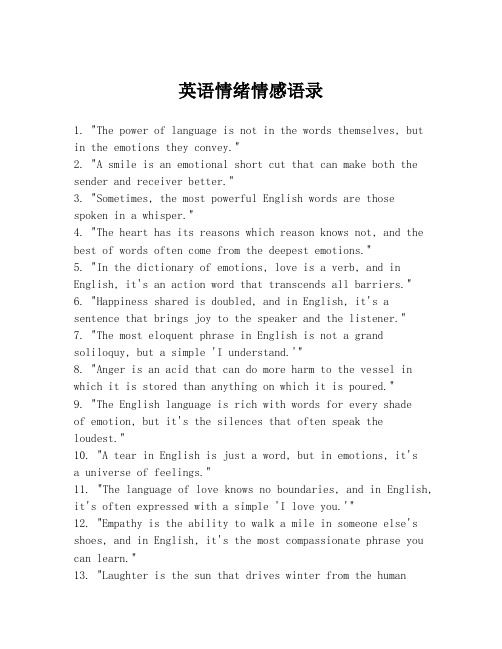
英语情绪情感语录1. "The power of language is not in the words themselves, but in the emotions they convey."2. "A smile is an emotional short cut that can make both the sender and receiver better."3. "Sometimes, the most powerful English words are those spoken in a whisper."4. "The heart has its reasons which reason knows not, and the best of words often come from the deepest emotions."5. "In the dictionary of emotions, love is a verb, and in English, it's an action word that transcends all barriers."6. "Happiness shared is doubled, and in English, it's a sentence that brings joy to the speaker and the listener."7. "The most eloquent phrase in English is not a grand soliloquy, but a simple 'I understand.'"8. "Anger is an acid that can do more harm to the vessel in which it is stored than anything on which it is poured."9. "The English language is rich with words for every shadeof emotion, but it's the silences that often speak the loudest."10. "A tear in English is just a word, but in emotions, it'sa universe of feelings."11. "The language of love knows no boundaries, and in English, it's often expressed with a simple 'I love you.'"12. "Empathy is the ability to walk a mile in someone else's shoes, and in English, it's the most compassionate phrase you can learn."13. "Laughter is the sun that drives winter from the humanface, and in English, it's a universal language of joy." 14. "The most profound emotions are often expressed in the simplest English phrases: 'You are not alone.'"15. "The English language is a tapestry of emotions, where each word is a thread that weaves together our shared human experience."。
表达情绪的英语高级句子适合作文

表达情绪的英语高级句子适合作文英文回答:Expressing Emotions with Nuance and Sophistication.1. A symphony of emotions.Emotions are like a symphony, a complex interplay of notes that weave together to create a rich tapestry of human experience. To capture the full depth and nuance of these emotions, language must dance around the delicate borders of meaning, evoking the subtle shades and intricate layers that define our inner landscapes.2. The linguistic tapestry of feelings.Words themselves become the threads that stitch together the tapestry of our emotions. Each word, a vibrant hue, adds a brushstroke to the canvas of our hearts. The judicious use of adjectives and adverbs, like deft strokesof a master painter, brings forth the subtle variations in intensity and tone. Metaphors and similes, like vibrant threads of gold and silver, weave intricate patterns, illuminating the hidden depths of our experiences.3. The music of eloquence.The rhythm and flow of language also play a pivotalrole in expressing emotions. Sentences, like musical phrases, can soar with passion or ebb with melancholy. The cadence of words, like the tempo of a symphony, can quicken with excitement or slow with sorrow. By harmonizing the cadence and rhythm of our speech, we can orchestrate a symphony of emotions that resonates with our audience.4. The power of understatement.Sometimes, the most eloquent expression of emotion lies in understatement. By hinting at a feeling rather than explicitly stating it, we invite our audience to delve into the depths of their own emotions. This subtle approach,like a whisper in the breeze, can evoke a profound sense ofconnection and shared understanding.5. The catharsis of articulation.Articulating our emotions is not merely a means of communication; it is a cathartic experience. Through words, we give shape to our intangible feelings, exorcising them from the confines of our hearts. The act of writing or speaking about our emotions allows us to process and heal, transforming the raw pain or unbridled joy into something tangible and manageable.6. The expansive vocabulary of the heart.To express emotions with precision and depth, we must expand our vocabulary beyond the confines of common usage. Seek out words that resonate with your experiences, words that capture the nuances and complexities of your inner world. By embracing a rich and expansive vocabulary, you unlock the doors to a realm of emotions that were once unspoken.7. The art of emotional connection.The ultimate goal of expressing emotions through language is to connect with others. By sharing our feelings, we forge bonds that transcend words. Our vulnerability becomes a bridge, inviting others to cross into the sanctuary of our hearts. Through the eloquence of our expression, we create a shared space where emotions resonate, empathy flows, and human connection flourishes.中文回答:表达情绪的高级英语句子。
人类拥有情感用英语

人类拥有情感用英语Emotions are a complex and integral part of the human experience. They are the subjective feelings that individuals experience in response to various stimuli, such as external events, relationships, thoughts, or memories. Here's a breakdown of the concept of emotions in English:1. Types of Emotions: There are many types of emotions, ranging from basic emotions like happiness, sadness, anger, fear, surprise, and disgust, to more complex ones like jealousy, empathy, and love.2. Expression of Emotions: Emotions are expressed through a combination of facial expressions, body language, tone of voice, and choice of words. For example, a smile often indicates happiness, while a frown can suggest sadness or anger.3. Functions of Emotions: Emotions serve several purposes. They can signal our needs to others (e.g., a baby's cry signals hunger), motivate behavior (e.g., fear can motivate escape from danger), and facilitate social bonding (e.g., shared joy can strengthen relationships).4. Cultural Differences: The way emotions are expressed and understood can vary significantly across cultures. What is considered an appropriate emotional response in one culture might be different in another.5. Emotional Intelligence: This refers to the ability to recognize, understand, and manage our own emotions and the emotions of others. It is a crucial skill for effective communication and relationship building.6. Emotional Regulation: This is the ability to modify and control one's emotions. It involves techniques such as cognitive reappraisal (changing how you think about a situation) and expressive suppression (managing how you express your emotions).7. Emotional Vocabulary: Learning the vocabulary to describe emotions in English is important for expressing oneself accurately. Words like "ecstatic," "melancholic," "irritated," and "apprehensive" can add nuance to how we convey our feelings.8. Emotional Health: Just as physical health is important, so is emotional health. It involves being able to cope withlife's challenges and maintain a balanced emotional state.9. Emotions in Literature and Art: Emotions are a central theme in literature and art. They are used to evoke feelings in the audience and to explore the human condition.10. Emotional Disorders: When emotions are not regulated properly, they can lead to various emotional disorders, such as depression, anxiety, and bipolar disorder, which may require professional treatment.Understanding emotions is fundamental to understanding human behavior and communication. They are a key aspect of psychology, sociology, and interpersonal relationships.。
传递情感的英语怎么说
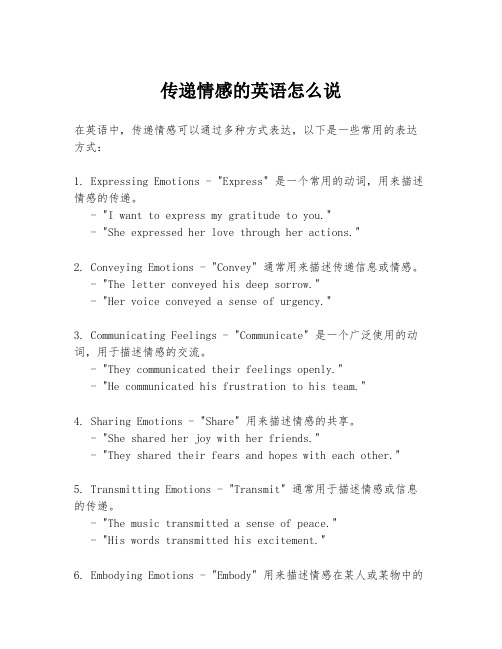
传递情感的英语怎么说在英语中,传递情感可以通过多种方式表达,以下是一些常用的表达方式:1. Expressing Emotions - "Express" 是一个常用的动词,用来描述情感的传递。
- "I want to express my gratitude to you."- "She expressed her love through her actions."2. Conveying Emotions - "Convey" 通常用来描述传递信息或情感。
- "The letter conveyed his deep sorrow."- "Her voice conveyed a sense of urgency."3. Communicating Feelings - "Communicate" 是一个广泛使用的动词,用于描述情感的交流。
- "They communicated their feelings openly."- "He communicated his frustration to his team."4. Sharing Emotions - "Share" 用来描述情感的共享。
- "She shared her joy with her friends."- "They shared their fears and hopes with each other."5. Transmitting Emotions - "Transmit" 通常用于描述情感或信息的传递。
- "The music transmitted a sense of peace."- "His words transmitted his excitement."6. Embodying Emotions - "Embody" 用来描述情感在某人或某物中的体现。
英语阅读能力提升-研究发现:翻译难以表达出情绪词汇的真正含义
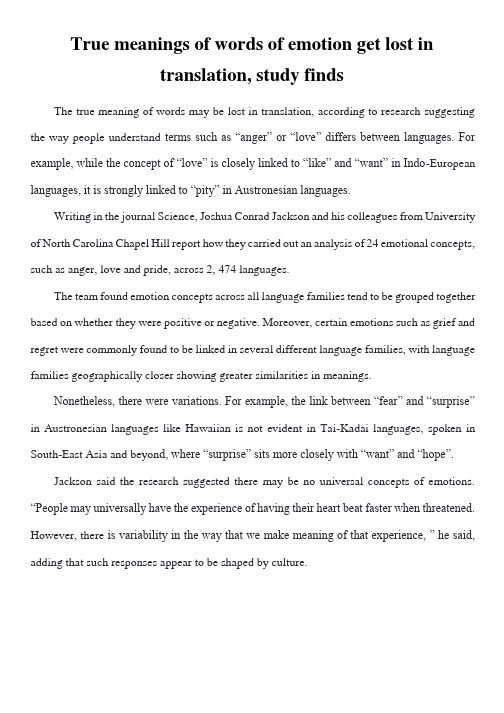
True meanings of words of emotion get lost intranslation, study findsThe true meaning of words may be lost in translation, according to research suggesting the way people understand terms such as “anger” or “love” differs between languages. For example, while the concept of “love” is closely linked to “like” and “want” in Indo-European languages, it is strongly linked to “pity” in Austronesian languages.Writing in the journal Science, Joshua Conrad Jackson and his colleagues from University of North Carolina Chapel Hill report how they carried out an analysis of 24 emotional concepts, such as anger, love and pride, across 2, 474 languages.The team found emotion concepts across all language families tend to be grouped together based on whether they were positive or negative. Moreover, certain emotions such as grief and regret were commonly found to be linked in several different language families, with language families geographically closer showing greater similarities in meanings.Nonetheless, there were variations. For example, the link between “fear” and “surprise” in Austronesian languages like Hawaiian is not evident in Tai-Kadai languages, spoken in South-East Asia and beyon d, where “surprise” sits more closely with “want” and “hope”.Jackson said the research suggested there may be no universal concepts of emotions. “People may universally have the experience of having their heart beat faster when threatened. However, there is variability in the way that we make meaning of that experience, ” he said, adding that such responses appear to be shaped by culture.用 2474 种语言说爱你,意思可能都不一样今日导读提到描述情绪的词语,大家可能会毫不费力地想起“愤怒”、“喜爱”等等。
深邃的情感英语

深邃的情感英语When exploring the depths of emotion through the English language, one can delve into a rich tapestry of words and expressions that capture the essence of human feelings.Here's a curated selection of content that reflects the profoundness of emotional experiences in English:1. Vocabulary of Emotion: Learning the nuances of emotion-related words can deepen your understanding and expression. Words like "ecstatic," "melancholic," "serene," and "heartfelt" offer a spectrum of emotional depth.2. Poetic Expressions: Poetry is a medium that often delves into the profound. Lines such as "I wandered lonely as a cloud / That floats on high o'er vales and hills" from William Wordsworth's "Daffodils" evoke a sense of tranquility and connection with nature.3. Lyrical Language: Song lyrics can be a powerful way to express deep emotions. For example, "Imagine there's no countries / It isn't hard to do / Nothing to kill or die for / And no religion too" from John Lennon's "Imagine" touches on universal peace and unity.4. Literary Quotes: Great literature often plumbs the depths of human emotion. A quote like "To feel the emotions of others is the true nature of compassion" from "The Alchemist" by Paulo Coelho reflects on the deep emotional connectionbetween individuals.5. Idiomatic Expressions: Idioms can convey complex emotions succinctly. Phrases like "to have one's heart in the right place" or "to be over the moon" encapsulate positiveemotional states.6. Emotional Dialogues: In plays and novels, dialogues can reveal deep emotional exchanges. For instance, inShakespeare's "Romeo and Juliet," the balcony scene is a poignant moment of young love and longing.7. Pronunciation of Emotion: The way we say words can convey emotion. Learning to modulate your voice to express happiness, sadness, anger, or surprise can make your English more expressive and engaging.8. Emotional Writing: Crafting sentences that convey deep emotion requires a thoughtful choice of words and a clear understanding of tone. Practice writing about personal experiences or emotions to enhance your emotional vocabulary.9. Cultural Expressions of Emotion: Different culturesexpress emotions in various ways. Learning about these differences can enrich your understanding of emotional expression in English.10. Empathy and Language: Developing empathy is key to understanding and expressing deep emotions. Active listening and using empathetic language can help in communicating with depth and sincerity.By engaging with these aspects of English, you can not only improve your language skills but also your ability to connect with others on an emotional level.。
情感的英语单词
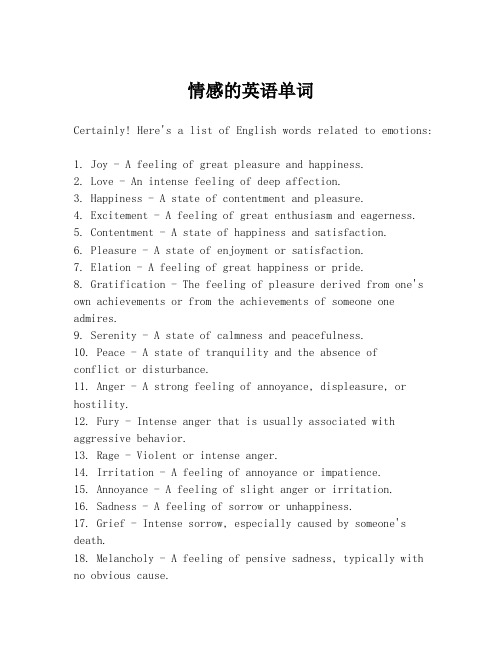
情感的英语单词Certainly! Here's a list of English words related to emotions:1. Joy - A feeling of great pleasure and happiness.2. Love - An intense feeling of deep affection.3. Happiness - A state of contentment and pleasure.4. Excitement - A feeling of great enthusiasm and eagerness.5. Contentment - A state of happiness and satisfaction.6. Pleasure - A state of enjoyment or satisfaction.7. Elation - A feeling of great happiness or pride.8. Gratification - The feeling of pleasure derived from one's own achievements or from the achievements of someone one admires.9. Serenity - A state of calmness and peacefulness.10. Peace - A state of tranquility and the absence ofconflict or disturbance.11. Anger - A strong feeling of annoyance, displeasure, or hostility.12. Fury - Intense anger that is usually associated with aggressive behavior.13. Rage - Violent or intense anger.14. Irritation - A feeling of annoyance or impatience.15. Annoyance - A feeling of slight anger or irritation.16. Sadness - A feeling of sorrow or unhappiness.17. Grief - Intense sorrow, especially caused by someone's death.18. Melancholy - A feeling of pensive sadness, typically with no obvious cause.19. Depression - A state of low mood and aversion to activity that can affect a person's thoughts, behavior, feelings, and sense of well-being.20. Despair - Complete loss of hope or belief in the possibility of a better outcome.21. Fear - An unpleasant emotion caused by perceived threat or danger.22. Anxiety - A feeling of worry, nervousness, or unease, typically about an imminent event or something with an uncertain outcome.23. Panic - A sudden overwhelming fear or anxiety that causesa person to act irrationally or without thinking.24. Envy - A feeling of discontented or resentful longing aroused by someone else's possessions, qualities, or luck. 25. Jealousy - The feeling that a person has when someone they care about has a close relationship with someone else.These words can be used to describe a wide range of emotional states, from the most positive to the most negative. Understanding and using these words can help in expressing one's feelings more accurately and empathizing with others.。
表达你的思想和情感英语
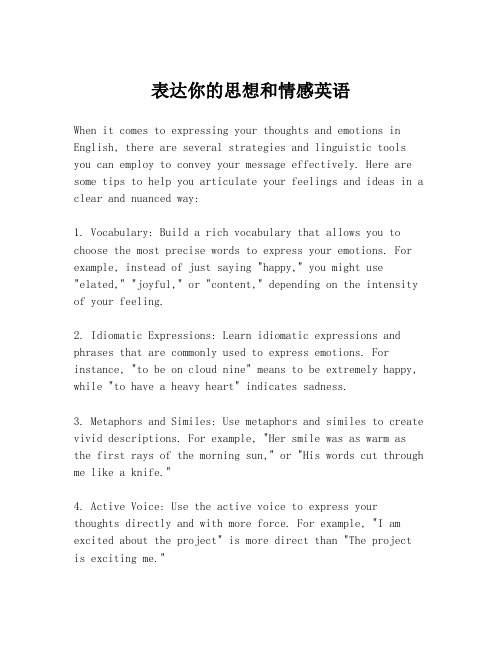
表达你的思想和情感英语When it comes to expressing your thoughts and emotions in English, there are several strategies and linguistic tools you can employ to convey your message effectively. Here are some tips to help you articulate your feelings and ideas in a clear and nuanced way:1. Vocabulary: Build a rich vocabulary that allows you to choose the most precise words to express your emotions. For example, instead of just saying "happy," you might use "elated," "joyful," or "content," depending on the intensity of your feeling.2. Idiomatic Expressions: Learn idiomatic expressions and phrases that are commonly used to express emotions. For instance, "to be on cloud nine" means to be extremely happy, while "to have a heavy heart" indicates sadness.3. Metaphors and Similes: Use metaphors and similes to create vivid descriptions. For example, "Her smile was as warm as the first rays of the morning sun," or "His words cut through me like a knife."4. Active Voice: Use the active voice to express your thoughts directly and with more force. For example, "I am excited about the project" is more direct than "The projectis exciting me."5. Modal Verbs: Modal verbs like "can," "could," "should," "would," and "might" can be used to express different levels of certainty or obligation. For example, "I would be delighted to help you" suggests a strong willingness.6. Questioning: Use questions to seek clarification or to express confusion or curiosity. For example, "What do you think about this idea?" or "How can we resolve this issue?"7. Body Language: Non-verbal cues can reinforce your verbal expressions. A smile, a frown, or a nod can go a long way in conveying your emotions.8. Tone of Voice: The tone in which you speak can convey alot about your emotions. A soft, gentle tone can express kindness, while a firm, assertive tone can show conviction.9. Writing Style: If you're expressing your thoughts in writing, use punctuation effectively. Exclamation marks can show excitement or anger, while ellipses can indicate hesitation or trailing off.10. Cultural Nuances: Be aware of cultural differences in expressing emotions. What is considered polite or intense in one culture may not be perceived the same way in another.11. Empathy: Show empathy in your expressions to connect with others on an emotional level. Phrases like "I can understand how you feel" or "That must have been difficult for you" can be very powerful.12. Direct Communication: Sometimes, the most straightforward approach is the best. If you're feeling upset, it's okay to say, "I feel upset because..."Remember, effective communication is not just about the words you use but also how you use them. Practice makes perfect, so keep refining your language skills to better express your thoughts and emotions in English.。
- 1、下载文档前请自行甄别文档内容的完整性,平台不提供额外的编辑、内容补充、找答案等附加服务。
- 2、"仅部分预览"的文档,不可在线预览部分如存在完整性等问题,可反馈申请退款(可完整预览的文档不适用该条件!)。
- 3、如文档侵犯您的权益,请联系客服反馈,我们会尽快为您处理(人工客服工作时间:9:00-18:30)。
N
nonplussed = so surprised that you don't know what to do next: "I was so nonplussed by his announcement that I couldn't say anything."
negative = when you can only see the disadvantages: "I feel very negative about my job – the pay is awful."
lively
lonely
lost
M
maternal = feeling like a mother: "Looking at my sister's new baby made me feel really maternal."
mad
moody
miserable
mischievous
appalled = very shocked: "They were appalled to hear that they would lose their jobs."
apprehensive = slightly worried: "I felt a little apprehensive before my interview."
anxious
agitated
B
bewildered = very confused: "He was bewildered by the choice of computers in the shop."
betrayed = when someone breaks the trust you have in them: "He betrayed my trust when he repeated my secret to everyone."
ashamed: "How could you say such a thing? You should be ashamed of yourself!"
at the end of your tether = completely fed up: "The children have been misbehaving all day – I'm at the end of my tether."
overjoyed
ornery
P
positive = opposite of negative – seeing the good side of something: "She's a very positive person and never lets anything get her down."
hyper
I
irritated = annoyed: "I get so irritated when he changes TV channels without asking me first."
intrigued = being so interested in something you have to find out more: "I'm intrigued to hear about your safari in Kenya."
sad: "It makes me sad to see all those animals in cages at the zoo."
scared = frightened: "Are you scared of heights?"
stressed = being worried or anxious about something so you can't relax: "I feel really stressed at work – I need a break."
glum
H
happy: "She was happy to hear the good news."
horrified = very shocked: "I'm horrified by the amount of violence on television today."
helpless
content
D
depressed = very sad: "After he failed his English exam, he was depressed for a week."
delighted = very happy: "I'm delighted that I got the job. It's just what I always wanted."
cheated = when you don't get something that you think you deserve: "Of course I feel cheated – I should have won that competition."
cross = quite angry: "I was cross with him for not helping me, as he said he would."
down in the dumps = sad and fed up: "What's the matter with him? He's so down in the dumps these days."
disappointed: "She was disappointed by her son's poor results at school."
lucky: "I'm going to play the lottery – I feel lucky today!"
let down = disappointed: "When you didn't turn up to the meeting, I felt really let down."
positive = very sure: "Are you sure that's what you want? Yes – I'm positive."
peaceful
proud
panicked
paranoid
pleased
R
relaxed: "I was completely relaxed after I came back from holiday."
injured
infatuated
J
jealous = envious: "She was jealous of her sister's new toy."
jaded = tired and having no interest: "After 10 years at this company, I just feel jaded."
joyful
K
keen: "I'm keen to see your new house – I've heard lots about it."
"I'm keen on keeping fit."
L
lazy: "I can't be bothered to do anything today – I feel really lazy!"
frightened: "As a child she was frightened of the dark."
fearful
frustrated
fearless
G
great = very good: "I feel great today!"
grief
guilt
grumpy
grouchy
belligerent
bored
C
confused: "I'm sorry I forgot your birthday – I was confused about the dates."
confident = sure of your abilities: "I'm confident that we can find a solution to this problem."
A
angry: "She was angry with her boss for criticising her work."
annoyed: "I'm very annoyed with him. He hasn't returned any of my calls."
"She was annoyed by his comments."
reluctant = when you don't want to do something: "I'm reluctant to buy a new car – the one we have is fine."
